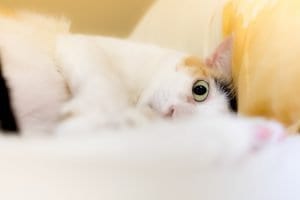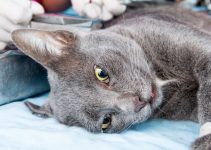Our paw friends are cute and lovable creatures, more often than not, they are adorable and cuddly. However, sometimes, their behavior might seem abnormal to you. Some cat parents get concerned when their Cats tend to be overly cuddly and clingy all of a sudden. What could be the possible explanations of that? Can my cat have mood swings? Moreover, why is my cat being so clingy all of a sudden?
NOTE: We want to inform our blog readers that before we publish any article, the team “Proudcatowners” does deep research based on experience and knowledge about cats and everything related to them, to guarantees reliable and precise information, satisfy the readers is our first priority.
Why is my cat being so clingy all of a sudden?
As pet owners, we develop a habit of noticing every little detail about our cats. That usually helps us understand what our cats want and need, however, it is not always an easy thing to do.
Some of our cats’ behaviors change so quickly sometimes, and they start exhibiting abnormal behaviors, such as being suddenly clingy, which confuse us. Cats tend to be clingy for several reasons such as medical conditions, age, stress, fear, anxiety, giving birth, or a change in their daily routine.
Undiagnosed medical condition:
Noticing your cat’s abnormal change in behavior is crucial, any sign could be a red flag. Some cats tend to become clingy all of a sudden and become extremely affectionate with you if they are in pain, or are experiencing an underlying medical condition.
There are cats, which become clingier to their owner before having a seizure. Although epilepsy is more common in dogs than in cats, it is still one of the main reasons that cats have seizures, in addition to other health conditions.
What causes seizures in cats?
A recent study has shown that up to 41 % of cats have epilepsy from an unknown cause, however, seizures in cats are not always related to epilepsy. Seizures will occur in cats of all ages, and all breeds, however, it is more common to occur with older cats. Here are some of the reasons behind seizures in cats:
- Tumors
- Trauma
- Feline infectious peritonitis
- Fungal, viral, parasite or bacterial infection
- Being exposed to toxins
- Reaction to certain medications
Truth or myth: seizures in cats are hereditary
There is very little evidence that links seizures in cats to a hereditary reason. However, cats who experience this disorder tend to have a structural change in their brain structure, which contributes to these seizures.
How do I know if my cat is having a seizure?
Seizures in cats can be extremely violent most of the time, but it can also be a lot calmer at times. Here is a list of the most common symptoms of seizures in cats:
- Aggression
- Abrupt energy and activity
- Hyper-salivation (drooling)
- Uncontrollable muscle activity
- Twitching in the face muscles
- Tremors
- Twitching of body muscles
- Convulsions
- Loss of consciousness
What should I do?
If you notice that your cat is experiencing a seizure, remove all sharp objects from its surroundings, and contact your veterinarian immediately. If you are not sure, if what your cat is experiencing is a seizure or not, record a video of it and show it to your veterinarian.
Stress and anxiety
If your pet becomes clingy all of a sudden, especially if you are about to leave the house, it can be a sign of anxiety in your cat. If your cat suffers from separation anxiety, it will experience a lot of distress when the pet parent is absent, especially if he or she leaves for a long time, such as going on vacation.
- Excessive vocalization
- Drooling
- Elimination outside the litter box
- Scratching and chewing furniture and other objects
Such behaviors usually start appearing in cats if the cat parent is absent for an extended period. These signs can be severe at times, as they can also be mild. Some cat parents tend to use natural repellents made of ingredients with smells that cats hate, and they spray it lightly on their furniture.
What should I do?
If you notice these behavioral changes in your cat, you should seek the help of a veterinary or a certified animal behaviorist. These specialists will help you cope with the situation, and guide you on how to deal with your cat. In some cases, providing your cat with some anti-anxiety medications would help it cope with your absence as well.
Fear

If your cat is not feeling safe inside the household, it can display signs of distress, in addition to becoming very clingy to you and constantly rubbing its face on you, especially if you are leaving the house. That feeling of safety is crucial for our pets, and if they do not attain that feeling, it could lead to fear and being extraordinarily clingy and affectionate.
This feeling of concern can be triggered because another cat or pet in the house is bullying the cat, or another human (child, neighbor, family member) is mistreating it. Try to monitor the other pets in your household, and how the other family members or friends treat your cat as well.
Another apparent reason of fear can be heavy weather. If your cat runs to you and becomes abruptly clingy if there is a thunderstorm, for example, it is clearly scared of that. Try to comfort it and keep it close to you until the storm passes.
Change in routine

Cats are a creature of habit, once they get used to a particular routine, they like to maintain it. Any change in their habitual routine, especially if it is sudden, can cause your little furry friend to be troubled. Here is a list of some things that can disrupt your cat’s routine:
- Getting a new pet
- The birth of a new baby
- The death of a family member
- a departure of a family member.
- Moving to a new household
These conditions could give your cat a sense of distress and make it cling more to you.
Age
Your cat’s ageing process can come with some worries. Although there are young cats who experience hearing loss and vision problems, these symptoms are recurrent in older cats more often. As cats grow older, they experience a decrease in their hearing ability and the vision as well.
If a cat cannot see or hear well, it can become very clingy to the pet parent because they know they are more aware of their environment and of what is happening. Being clingy when it comes to older cats can also indicate an early stage of dysfunction. You can notice this if your cat starts losing balance or bumping into things when it is walking. In this case, a veterinary check-up is necessary.
Mother to be

If your cat is pregnant, and it is close to giving birth, it can show you more affection than usual. Mothers-to-be tend to be extremely affectionate and clingy because giving birth is stressful for them, and they need you to comfort them during these hard times. Take this behavior as a compliment, and as a sign that your cat loves you, trusts you, and it feels comfortable around you.
Adoption
Just like orphanages, animal shelters are also filled with secrets. Many pet parents adopt a cat and return it, and many cats in the shelter have a complex and unknown history. If you adopt a new cat, you must be careful and delicate with it. You do not know what it has been through before finding its home in your household. Your cat might seem outgoing before you adopt it, but it gets very shy and very clingy once you take it home.
This can be their way of reassuring themselves that this is their new home, instead of another temporary household. Your new cat might take some time to adjust and get used to the new environment, but you can help it by playing with it, giving it treats and setting a new routine for them to make them feel more at home.
What should I do?
If you notice that your cat is so clingy all of a sudden, and showing you more affection than usual, do not ignore it. Keep an eye on your cat and monitor its behavior. If you notice an abrupt behavior, or anything abnormal or worrisome, contact your veterinarian for proper medical advice.
Try to take notes of when these behavioral changes occur in your cat, and how often do they occur, that would make it easier to diagnose the reasons for the cat’s behaviors. Sometimes it can be due to weather changes and temperature drop, while other times it can be because of anxiety or sickness. Providing your vet with this information will be helpful.
Why does my cat follow me everywhere?
As we all know, cats are affectionate by nature, some of them tend to show their affection physically, such as laying on top of us or climbing onto our laps. While other cats do not like physical affection, and they prefer to stay close to us instead and follow us around consistently.
Your cat could be following you because it enjoys your company, or because it needs something. Sometimes, your cat could be following you around for both reasons.
Food time

Many pet parents notice that their cats tend to follow them everywhere and get very close to them when it is time for their meal. As we said before, cats are creatures of habit, and once they get used to being fed at a particular time, they always expect their meal to be served around that time.
Your cat would follow you around and make sure you do not leave its sight until you give it its food. However, a feeding routine is not the only reason your cat is following you to ask for food, and it can also be a sign of an underlying medical condition, such as diabetes and hyperthyroidism. These two conditions can cause hunger in your cat more often, and make it clingier to you.
Steps to follow?
If you notice that your cat is expressing a sudden change in behavior, make sure you contact a veterinarian. Your cat can simply be clingy around food time out of habit, but it can also reveal some medical conditions. Better safe than sorry!
Curiosity killed privacy
A proverb says, “Curiosity killed the cat”, but in our case, your cat’s curiosity killed your privacy. Sometimes your cat would be clingy to you and follow you around because it is curious about you and your daily activities.
Many pet parents told stories about their cats following them into rooms they are not supposed to be in, or entering their office while they are working and knocking off papers off the desk.
Seeking attention
Many pet parents noticed that cats keep meowing when they are following them around. If your cat is clingy all of a sudden, and it keeps meowing, it means it is asking for your attention. If you do not wish for this behavior to continue, avoid giving your cat attention when it exhibits such behaviors. However, if you notice any other symptoms that might worry you, seek a veterinarian’s advice.
Other reasons why your cat is meowing
- Your cat could be sick.
- Hunger
- Stress or fear
- Confusion due to old age
- Your cat is in heat
What are the signs of affection in cats?
If your cat is so clingy to you all of a sudden, one of the reasons for that could be because it is showing you affection. But how do you know if your cat is showing affection, or exhibiting an abnormal behavior? Here is a list of signs that indicate your cat is showing you affection:
- Slowly blinking at you
- Grooming you
- Purring
- Rubbing their cheeks on you
- Bopping their head against yours
- Showing you their belly
- Following you and spending time with you
Although cats can be subtle creatures, they sure know how to show you affection. But how do you show your cats that you love them back? Here is a list of gestures you can make to prove to your cats their love is not one-sided.
- Groom your cat
- Slowly blink at your cat as well
- Do not ignore it or push it away
- And finally, hang out with your cat
After mentioning the possible reasons of why your cat is suddenly so clingy to you, there is another to add, which is their personality. Just like humans have different personalities and traits, so do our furry friends. There are different types of cats, and one of them is the overly affectionate cat.
How do I know if my cat is the overly affectionate type?
- It refuses to let you go
- It is always up in your space
- It invades your privacy
- It is very clingy to you
- It grabs your clothes with its claws
- It holds on to you and refuses to let go
- It follows you everywhere
- It wants constant attention
Why is my cat suddenly so clingy and needy?
If your cat becomes overly affectionate and needy all of a sudden, you should consider its environment, its behavior, and the situation as well. You should observe the cats’ actions to determine why they are acting this way. The reasons of why your cat is so clingy all of a sudden include fear, anxiety, feeling ignored, or being cold.
What should I do?
If your cat is naturally overly affectionate, make sure you provide the proper environment and give it attention. However, if its behavior becomes abnormal and it becomes too clingy, you should check with a veterinarian to determine the cause of your cat’s condition.
My cat keeps reaching out to me with its paws
If your cat is reaching out to you with its paw, it means it is seeking attention and asking you to care for it right now. Be delicate you’re your cat’s behavior, and make sure you do not play along with your cat if you want it to change its way of approaching you.
How can I stop my cat from following me everywhere?
Some pet parents complain about the fact that their cats became so clingy, like their shadows, and they even follow them to the bathroom. If you want to stop your cat from following you everywhere, you should set up some distractions for it in its environment, such as a fish tank, for example.
Some people would ignore their cats or do something that would make their cats dislike them to stop following them, which something we do not recommend. Your cat is following you because it loves you and wants to know what you are doing. If you do not want that behavior, try to turn your cat down gently, and reward it with treats and other toys to play with, or a perch near a window.
Can cats have a favorite person?
Cats have an animal extinct, which is why and they are usually attracted to the person that cares for them, and with whom they feel safe, loved, and protected. Your cat’s favorite person is typically the one that plays with it the most, cares for it, and spends more time with it.
However, some cats tend to choose a favorite person based on arbitrariness, some of them would choose the person they prefer according to their smell. Keep in mind that a cat is a creature of habit, and it can even recognize the owner’s voice. If your care for it and love it dearly, you win the game.
Do cats tolerate kisses from humans?
The feline population has lived with humans for centuries, they became very close and adapted with each other. Cats usually do not refuse human kisses, and they can tolerate them, and even like them and respond to the person who kisses them. If you kiss your cat gently, it might react with a small tap on your head with its paw.
However, remember that cats have different personalities, there are some cats who do not like physical affection. If you approach a cat for a kiss and it declines it, do not force it. No means no.
Can my cat get its feelings hurt?
Many veterinarians agreed that cats could develop hurt feelings because their emotions can range from happy to sad. Some parents tend to scream or be violent with their cats to stop them from being so clingy, however, that could hurt the cat and make it extremely sad. Treat your cat with care, and it just wants to love you.
Do cats get jealous?
Yes, just like humans, cats also get jealous. Your cat can get jealous if it feels like it is being excluded from something, or if there is a new member in the family (new pet, new baby, or a guest). Your cat would try to get your attention more by being so clingy to you.
Conclusion
Our cats are demanding creatures, and all we can do is love them right and care for them. However, sometimes our cats become too needy, and they start following us around too much, and that can make us wonder, why is my cat being so clingy all of a sudden. Some of the reasons for that include stress, anxiety, an underlying disease, fear, a change in environment, or routine. Your cat would sometimes follow you around if it is food time, or if it is seeking attention. Occasionally, our cats could become overly affectionate if they are scared or cold, for example.
Some pet parents get annoyed by their cats which follow them everywhere, and they try to stop that behavior. Avoid yelling at your cat or upsetting them, because cats can get hurt and jealous, just like humans. If you notice an abnormal change in your cat’s behavior, consult with a veterinarian. If the problem is not medical, a veterinary behaviorist could help you adapt to your cat’s behavior, and guide you on how to act around it.




